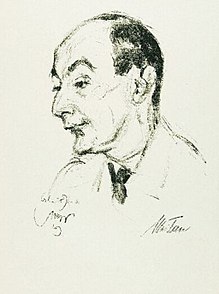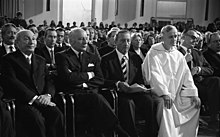This article has multiple issues. Please help improve it or discuss these issues on the talk page. (Learn how and when to remove these messages)
|
| Max Tau | |
|---|---|
 Max Tau, the lithograph by Emil Stumpp, 1929 Max Tau, the lithograph by Emil Stumpp, 1929 | |
| Born | (1897-01-19)19 January 1897 Bytom, Beuthen, Upper Silesia, German Empire (present-day Poland) |
| Died | 13 March 1976(1976-03-13) (aged 79) Oslo, Norway |
| Nationality | Norwegian and German |
| Alma mater | University of Kiel |
| Occupation(s) | Publisher and writer |
| Years active | 1928–1976 |
| Employer(s) | Grundt Tanum, Aschehoug |
| Known for | Building cultural relations between Norway and Germany |
| Spouse | Tove Filseth |
| Parent(s) | Nathan Tau (1870–1941) and Julie Julius (1874–1942 |
Max Tau was a German–Norwegian writer, editor, and publisher.
Life

Credit: Deutsche Bundearchiv
Tau grew up in an environment characterized by what he later termed the "Jewish-German" symbiosis, in a Jewish household heavily influenced by the Jewish enlightenment. He studied literature, art history, philosophy, and psychology at universities in Berlin, Hamburg, and Kiel. He earned his doctorate at the University of Kiel, defending a dissertation on the German writer Theodor Fontane. With the assistance of Mildred Fish Harnack, an American active in the Red Orchestra anti-Nazi resistance group, Tau emigrated to Norway in 1935. During the Nazi-German occupation of Norway, he was a refugee in Sweden and returned to Norway after the war. He was noted for his contribution to promoting literary exchange between Germany and Norway, especially in the context of reconciliation after World War II. He obtained Norwegian citizenship while in exile in Sweden in 1944.
Awards
- 1950 Peace Prize of the German Book Trade
- 1965 Nelly Sachs Prize
- 1970 Sonning Prize
References
- Rebecca Donner (5 August 2021). All the Frequent Troubles of Our Days: The True Story of the American Woman at the Heart of the German Resistance to Hitler. Canongate Books. p. 212. ISBN 9781-78-6892201. Retrieved 8 August 2021.
- Lorenz, Einhart (2000). "Max Tau". In Helle, Knut (ed.). Norsk biografisk leksikon (in Norwegian). Vol. 2. Oslo: Kunnskapsforlaget. Retrieved 21 April 2009.
External links
![]() Media related to Max Tau at Wikimedia Commons
Media related to Max Tau at Wikimedia Commons
| Recipients of the Sonning Prize | |
|---|---|
|